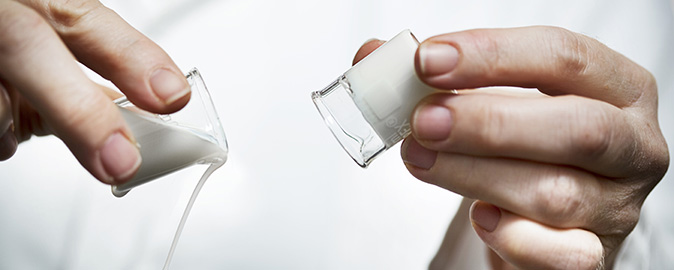Milk – inexpensive high-value raw material
Dairy research is one of the core areas at Aarhus University – and with good reason. New knowledge about the composition and quality of milk is of vital importance not only for the health of the consumers but also for the development of the industry.

Milk is big business. In 2015 alone, Danish manufacturers exported dairy products at a value of approx. DKK 17 billion, therefore milk is not only a significant source of income for the individual farmer and the dairies but also for the community as a whole.
How did Danish milk and Danish dairy products in particular become so successful? The close collaboration between companies and universities and the focus on research largely explains why.
At Aarhus University researchers work together with the industry during all stages of the production chain – from the correlation between genes and milk functionality, to new processing options and investigations into the health aspects of consuming milk. This holistic approach to the food chain is one of the underpinning reasons allowing Aarhus University – through DCA - Danish Centre for Food and Agriculture – to act as an advisor to the Ministry of Environment and Food of Denmark on raw material and food quality, including milk.
At the Department of Food Science which includes dairy research, the Head of Department Michelle Williams is very aware of the importance of the collaboration between the research environment and the industry:
- Research in milk composition and raw material quality is of significant importance, not only to understand its nutritional value but also its potential use and value in the production of value-added dairy products. Therefore, at Aarhus University, we continually focus on ensuring that our dairy research is relevant and matches both the industry’s and the authorities’ priorities for new knowledge and new technologies. It is not just a matter of partnering companies, it’s also about ensuring that the consumers will have access to quality and healthy foods, Michelle Williams says.
It starts with the gene
The University holds a very strong position within genetics. In this field, researchers carry out interdisciplinary research to determine how the cow’s genes influence milk properties, how to adapt the breeding material, as well as change milk composition through different feeding strategies.
- This is a relatively new research area which holds tremendous commercial potential, Michelle Williams says and refers to a project in which researchers have demonstrated significant differences in milk quality between individual cows and races with regard to the ability of the milk to coagulate, i.e. how suitable the milks is for cheese production.
However, Aarhus University also has a strong focus on the part of the food chain from the time cow is milked until the milk is consumed at the kitchen table. Therefore, researchers have a particularly close cooperation with Arla Foods in order to exchange new knowledge about the correlation between quality and production methods, processing and storage.
- There are many aspects to this research, it is not only about testing new technologies for e.g. cooling and packaging, but also – more specifically – about examining how to reduce the salt content in cheese and prolong the shelf life of lactose free milk, Michelle Williams says.
Nutrition in focus
A substantial part of this new knowledge would have been wasted if there was no demand for milk. Luckily, there is a demand! Last year, the average Dane drank 88 liters of liquid milk – and this volume has been maintained over the past ten years. This is the reason why the consumer perspective is very important to researchers.
Last year Arla Foods announced that they will invest DKK 62.5 million in a new Arla Foods for Health research center with Aarhus University and University of Copenhagen and thereby to form a public:private partnership. They expect the funds to finance approx. 40 PhD and postdoc positions focused on research understanding the nutritional and health effects of dairy products.
- We have an excellent cooperation with the Danish dairy industry – and this is validated by the new Arla Foods for Health research center. Through the Center activities we expect to demonstrate that Denmark is leading in its innovative approach to delivering new knowledge and talent as well as ensure healthy and nutritional dairy products are delivered to the market, Michelle Williams says.
Yderligere information
Visit the theme page
Head of Department Michelle Williams
Department of Food Science, Aarhus University
E-mail: mw@food.au.dk
Phone: +45 8715 7957/+45 87158 335
Mobile: +45 2517 0049
